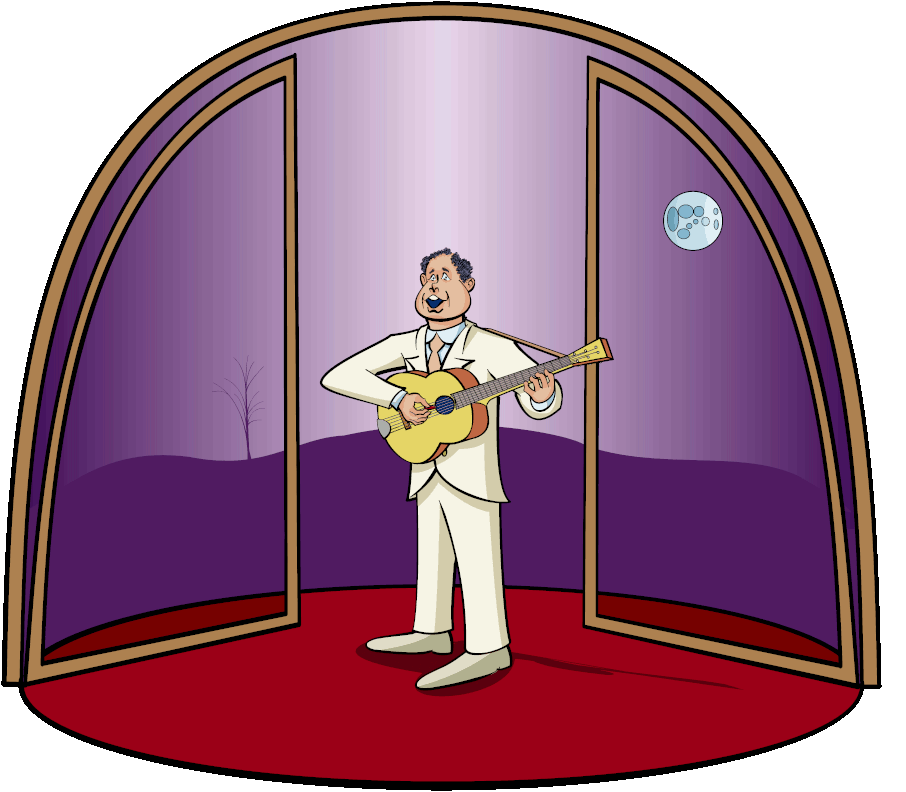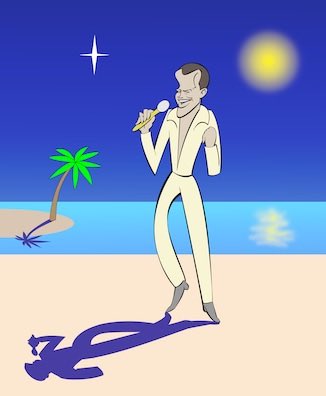Sir Lancelot
(Click on the image to zoom in.)

If anyone asks who was the first calypso singer to gain fame in the United States, they would probably say Harold George Bellanfanti, best known as Harry Belafonte. Certainly Harry gained the greatest celebrity in that musical genre when he began performing in the late 1940's and beginning a career that spanned more than 70 years.

Harry Belafonte
(Click to zoom in and out.)
On the other hand, it isn't widely known that Harry was actually a native of New York City. But when he was still a kid he went to live with his grandmother in Jamaica. Then after a few years he returned to New York but with a trace of the Jamaica dialect in his speech.
But Lancelot Pinard was born on the island of Martinique. His family, though, was quite well-to-do (his dad was a government official) and they considered the "folk" traditions of the island a bit disreputable. So Lancelot, who showed early musical talent, studied classical music and he developed a fine singing voice.
Like many prim and proper citizens, Lancelot's folks wanted him to pursue a less artsy career than music and at first he studied to be a pharmacist. Then in the late 1930's he moved to New York to pursue a career in medicine. So it wasn't until 1940 when he was in his late 30's that Lancelot actually become a calypsonian.
What happened was that in New York Lancelot had been singing classical songs for small audiences. But then the calypso band leader Gerald Clark heard him. Gerald had a recording session scheduled and he didn't have a singer lined up. So he tapped Lancelot and asked if he'd cut some sides.
Lancelot was surprised at the offer but agreed and decided to become a calypso singer. He continued to record with Gerald and his band, the Calypso Serenaders, and also began appearing as a soloist in Greenwich Village at the Village Vanguard. Soon he began a tour which took him to Hollywood where he was offered a part in the movie Two Yanks in Trinidad starring Pat O'Brien and Janet Blair.
Unfortunately, Lancelot's success did not set well with his family. As Lancelot said later the rule of uppercrust Trinidadians was that "Gentlemen don't play calypso". That the son of a prominent family decided to give up a medical career to be a lowly folk folk singer created much shame and scandal in the family. In fact Lancelot's song - Shame and Scandal In the Family - has been cited as a being inspired by his falling out even though the lyrics suggest the topic is about something else.
Back home for a visit Lancelot found the family wanted nothing to do with their wayward son. His brothers even urged their father to get Lancelot off the island altogether. So it didn't really take much prodding for Lancelot to head back to New York.
In addition to his singing, Lancelot continued to appear in films. After Two Yanks in Trinidad (1942), he was in Happy Go Lucky (1943), The Ghost Ship (1943), The Curse of the Cat People (1944), The Disillusioned Bluebird (1944), Eve Knew Her Apples (1945), Zombies on Broadway (1945), Brute Force (1947), Be Good (1947), Romance on the High Seas (1948), The Unknown Terror (1957), and The Buccaneer (1958). Most of these were "B" movies and Lancelot had small and often uncredited parts. But some were higher class cinema and he appeared as a crew member of the charter boat with Humphrey Bogart and Lauren Bacall in To Have and Have Not (1944). Of course in television's fledgling years he appeared on Father Knows Best (1954), and Lux Video Theatre (1950). In 1960 the year he became a US citizen, he appeared on The Andy Griffith Show.
It was also in 1960 that Lancelot began a tour of Europe. It was successful and for the next decade he stayed on the continent and in England. Why he opted to remain isn't really known but it does need to be remembered that this was a time that in the United States segregation was the law of the land and access to many theaters, restaurants, public transportation, and parks and recreational areas were restricted by race. In Europe on the other hand minority races lived under no such restrictions.1
Footnote
Before the federal Civil Rights Act went into force in 1964, Sammy Davis, Jr., one of the most popular entertainers in America, sometimes had to enter the night clubs and hotels where he was performing by the back door. When Jesse Owens returned from the 1936 Olympics after winning four gold medals and attended a banquet in his honor, he had to enter the hotel by the service entrance.
Sir Lancelot remained popular in Europe. He did sing and perform in America with a fellow Trinidadian, Stephen Springer, who toured internationally, but by the 1980's he was performing mostly for local venues and small audiences. His later songs did become somewhat more political and were outspoken about dictatorship and were decidedly anti-war. But in the end he lived a long life and actually made it past the Millennium to 2001, age 98.
Perhaps Sir Lancelot's best claim to fame is for one song for has been virtually forgotten, and in fact, was unknown for many years. It had been selected as the theme song for a new television series and in the pilot episode the song starts out with Sir Lancelot's singing:
In tropical sea is a tropic port.
Vacation fun is the favorite sport.
This is the place where the tourists flock,
Renting the boats at the busy dock.
However, the pilot wasn't broadcast when intended. Instead, when the show was finally aired it started off with a new show and a new theme sung by a new group.
Just sit right back and you'll hear a tale,
A tale of a fateful trip.
That started from this tropic port,
Aboard this tiny ship.
Yep. Sir Lancelot sang the original theme song of Gilligan's Island.
References and Further Reading
"Lancelot Pinard; Musician Brought Calypso to U.S.", Los Angeles Times, March 18, 2001.
"From Trinidad and Tobago to the World: Determining the role of Calypso in a new Era", Malek Abdel-Shehid, Caribbean Quilt, May 2020.
Reggae and Caribbean Music, Dave Thompson, Backbeat Books, 2002.
"The Subversive Power of Calypso Music", Benjamin Ramm, BBC, Octobr 11, 2017.